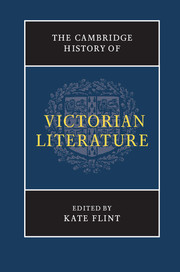Book contents
- Frontmatter
- Introduction
- PART I AUTHORS, READERS, AND PUBLISHERS
- PART II WRITING VICTORIA’s ENGLAND
- PART III MODES OF WRITING
- PART IV MATTERS OF DEBATE
- 15 Education
- 16 Spirituality
- 17 Material
- 18 Economics and finance
- 19 History
- 20 Sexuality
- 21 Aesthetics
- 22 Science and literature
- 23 Subjectivity, psychology, and the imagination
- 24 Cityscapes
- 25 The rural scene: Victorian literature and the natural world
- 26 ‘The annihilation of space and time’: literature and technology
- PART V SPACES OF WRITING
- PART VI VICTORIAN AFTERLIVES
- Select bibliography
- Index
24 - Cityscapes
from PART IV - MATTERS OF DEBATE
Published online by Cambridge University Press: 28 March 2012
- Frontmatter
- Introduction
- PART I AUTHORS, READERS, AND PUBLISHERS
- PART II WRITING VICTORIA’s ENGLAND
- PART III MODES OF WRITING
- PART IV MATTERS OF DEBATE
- 15 Education
- 16 Spirituality
- 17 Material
- 18 Economics and finance
- 19 History
- 20 Sexuality
- 21 Aesthetics
- 22 Science and literature
- 23 Subjectivity, psychology, and the imagination
- 24 Cityscapes
- 25 The rural scene: Victorian literature and the natural world
- 26 ‘The annihilation of space and time’: literature and technology
- PART V SPACES OF WRITING
- PART VI VICTORIAN AFTERLIVES
- Select bibliography
- Index
Summary
During the Victorian period the landscape of Britain was utterly transformed by unprecedented urban expansion, the movement of populations away from rural areas, and the proliferation of new industrial cities in the north of England. By the middle of the nineteenth century, for the first time in any country in human history, over half the population resided in towns or cities, tipping the balance away from a rural nation. For those Britons used to an agricultural economy and cottage industry, migrating from country to city meant learning how to subsist in a wholly new environment, in which traditional modes of working, dwelling, and even eating were all dramatically altered. Urban dwellers confronted overcrowding, strange and often dangerous working conditions, primitive and filthy living arrangements, polluted water and air, and rapidly spreading epidemic diseases. Factory work meant getting accustomed to new machines, new spaces and rhythms of labour, and reliance on inadequate wages. The configuration of the family changed as women and older children were hired more readily than their more highly paid husbands and fathers and left the home to work. Wives suffered the humiliation of demeaning work conditions, husbands faced unemployment, and, with mothers working outside the home, babies were farmed out to minders. Industrial production created new classes of employers and workers – ‘masters’ and ‘men’ as they were called – and London witnessed the growth of sweated industries and, especially in the last decades of the century, casual labour.
- Type
- Chapter
- Information
- The Cambridge History of Victorian Literature , pp. 510 - 531Publisher: Cambridge University PressPrint publication year: 2012

